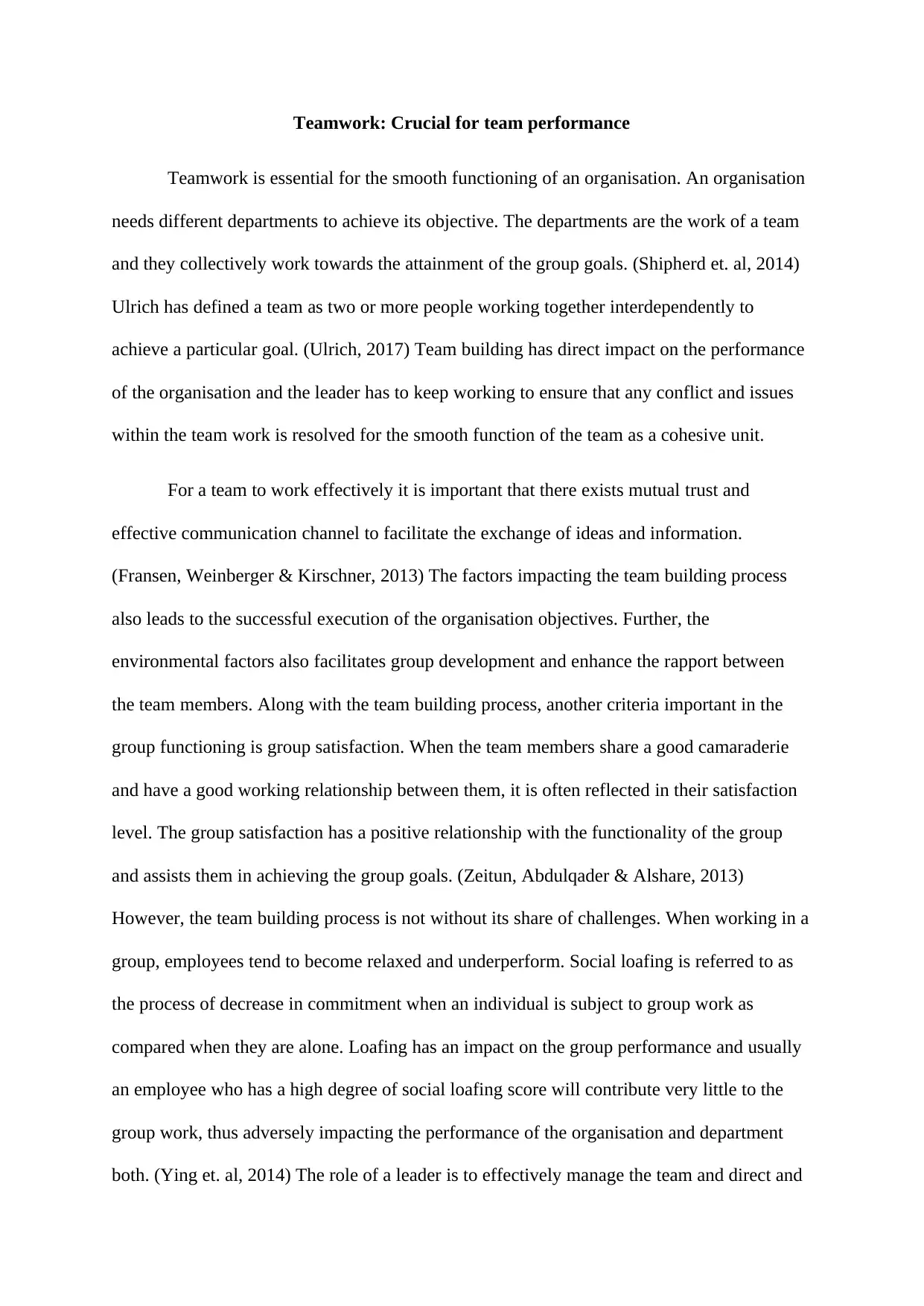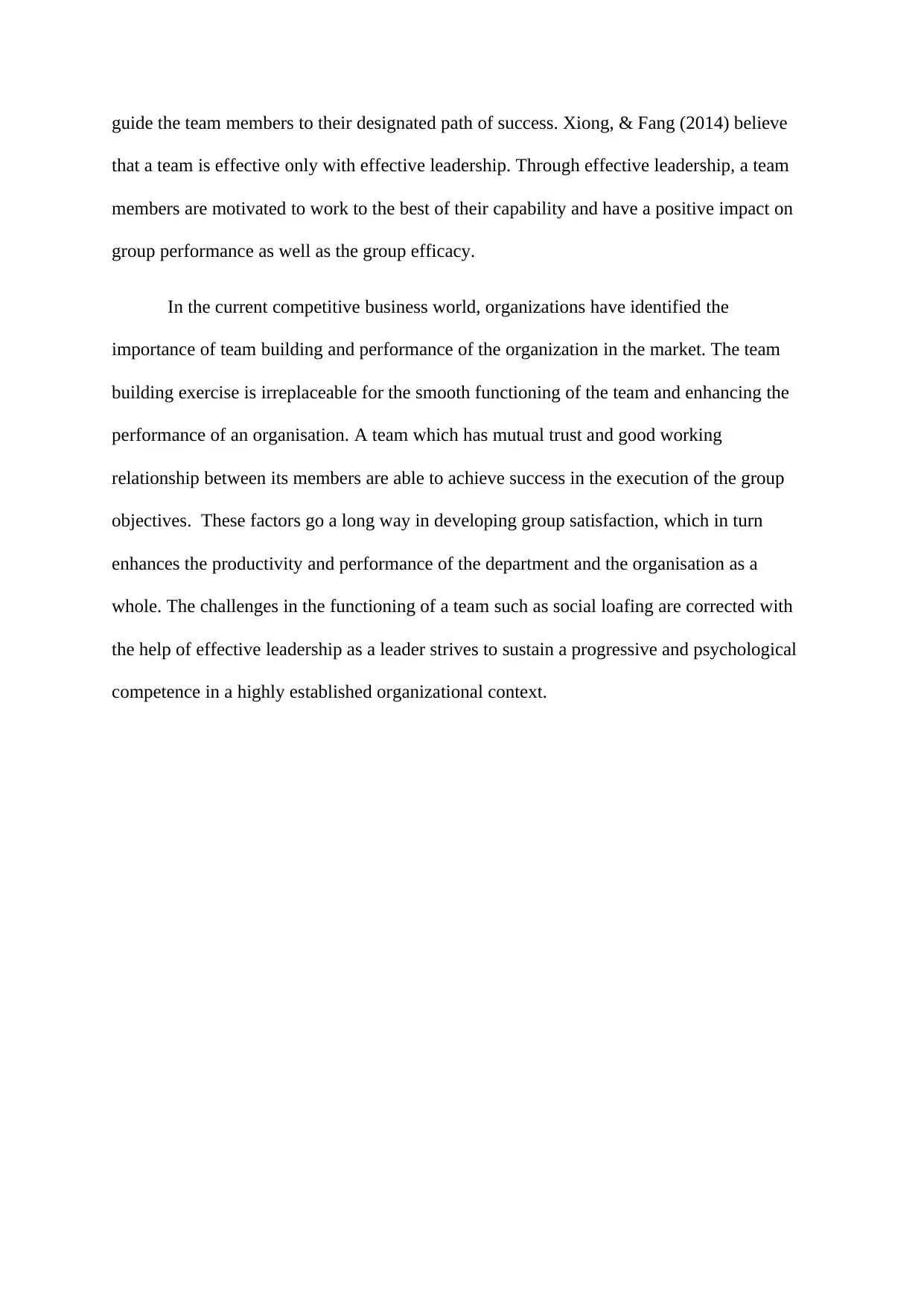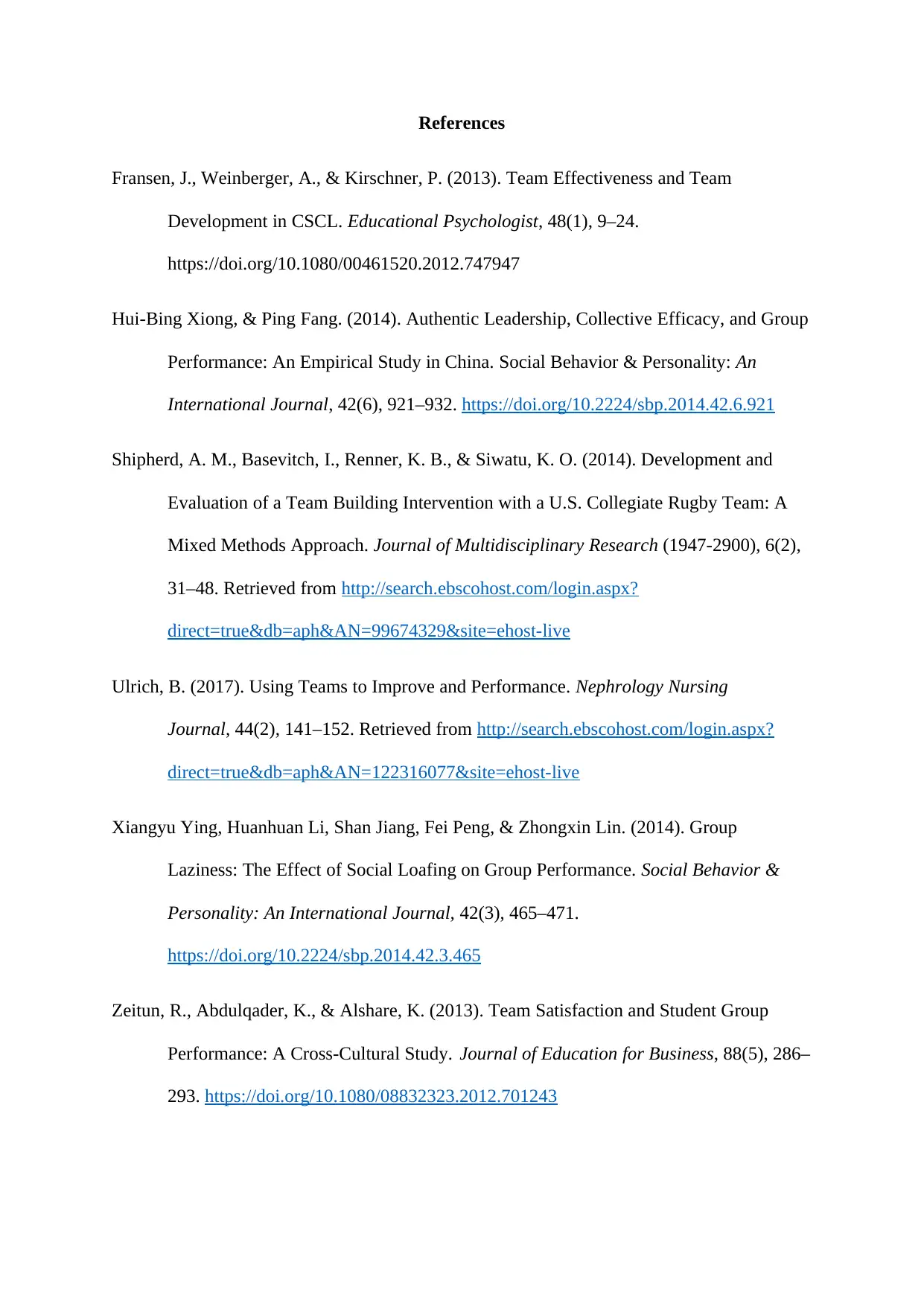Teamwork: Crucial for Team Performance - MGT502 Essay
VerifiedAdded on 2023/01/05
|4
|876
|62
Essay
AI Summary
This essay delves into the crucial role of teamwork in organizational settings. It emphasizes how teamwork, characterized by interdependence and shared goals, directly impacts organizational performance. The essay highlights the significance of effective communication, mutual trust, and the establishment of a positive working environment for successful team functioning. Furthermore, it addresses the challenges inherent in teamwork, such as social loafing, and underscores the essential role of leadership in mitigating these issues and fostering a productive team dynamic. The essay references several studies to support its arguments, ultimately concluding that teamwork, supported by strong leadership, is indispensable for achieving organizational objectives and enhancing overall performance.

Teamwork: Crucial for team performance
Teamwork is essential for the smooth functioning of an organisation. An organisation
needs different departments to achieve its objective. The departments are the work of a team
and they collectively work towards the attainment of the group goals. (Shipherd et. al, 2014)
Ulrich has defined a team as two or more people working together interdependently to
achieve a particular goal. (Ulrich, 2017) Team building has direct impact on the performance
of the organisation and the leader has to keep working to ensure that any conflict and issues
within the team work is resolved for the smooth function of the team as a cohesive unit.
For a team to work effectively it is important that there exists mutual trust and
effective communication channel to facilitate the exchange of ideas and information.
(Fransen, Weinberger & Kirschner, 2013) The factors impacting the team building process
also leads to the successful execution of the organisation objectives. Further, the
environmental factors also facilitates group development and enhance the rapport between
the team members. Along with the team building process, another criteria important in the
group functioning is group satisfaction. When the team members share a good camaraderie
and have a good working relationship between them, it is often reflected in their satisfaction
level. The group satisfaction has a positive relationship with the functionality of the group
and assists them in achieving the group goals. (Zeitun, Abdulqader & Alshare, 2013)
However, the team building process is not without its share of challenges. When working in a
group, employees tend to become relaxed and underperform. Social loafing is referred to as
the process of decrease in commitment when an individual is subject to group work as
compared when they are alone. Loafing has an impact on the group performance and usually
an employee who has a high degree of social loafing score will contribute very little to the
group work, thus adversely impacting the performance of the organisation and department
both. (Ying et. al, 2014) The role of a leader is to effectively manage the team and direct and
Teamwork is essential for the smooth functioning of an organisation. An organisation
needs different departments to achieve its objective. The departments are the work of a team
and they collectively work towards the attainment of the group goals. (Shipherd et. al, 2014)
Ulrich has defined a team as two or more people working together interdependently to
achieve a particular goal. (Ulrich, 2017) Team building has direct impact on the performance
of the organisation and the leader has to keep working to ensure that any conflict and issues
within the team work is resolved for the smooth function of the team as a cohesive unit.
For a team to work effectively it is important that there exists mutual trust and
effective communication channel to facilitate the exchange of ideas and information.
(Fransen, Weinberger & Kirschner, 2013) The factors impacting the team building process
also leads to the successful execution of the organisation objectives. Further, the
environmental factors also facilitates group development and enhance the rapport between
the team members. Along with the team building process, another criteria important in the
group functioning is group satisfaction. When the team members share a good camaraderie
and have a good working relationship between them, it is often reflected in their satisfaction
level. The group satisfaction has a positive relationship with the functionality of the group
and assists them in achieving the group goals. (Zeitun, Abdulqader & Alshare, 2013)
However, the team building process is not without its share of challenges. When working in a
group, employees tend to become relaxed and underperform. Social loafing is referred to as
the process of decrease in commitment when an individual is subject to group work as
compared when they are alone. Loafing has an impact on the group performance and usually
an employee who has a high degree of social loafing score will contribute very little to the
group work, thus adversely impacting the performance of the organisation and department
both. (Ying et. al, 2014) The role of a leader is to effectively manage the team and direct and
Paraphrase This Document
Need a fresh take? Get an instant paraphrase of this document with our AI Paraphraser

guide the team members to their designated path of success. Xiong, & Fang (2014) believe
that a team is effective only with effective leadership. Through effective leadership, a team
members are motivated to work to the best of their capability and have a positive impact on
group performance as well as the group efficacy.
In the current competitive business world, organizations have identified the
importance of team building and performance of the organization in the market. The team
building exercise is irreplaceable for the smooth functioning of the team and enhancing the
performance of an organisation. A team which has mutual trust and good working
relationship between its members are able to achieve success in the execution of the group
objectives. These factors go a long way in developing group satisfaction, which in turn
enhances the productivity and performance of the department and the organisation as a
whole. The challenges in the functioning of a team such as social loafing are corrected with
the help of effective leadership as a leader strives to sustain a progressive and psychological
competence in a highly established organizational context.
that a team is effective only with effective leadership. Through effective leadership, a team
members are motivated to work to the best of their capability and have a positive impact on
group performance as well as the group efficacy.
In the current competitive business world, organizations have identified the
importance of team building and performance of the organization in the market. The team
building exercise is irreplaceable for the smooth functioning of the team and enhancing the
performance of an organisation. A team which has mutual trust and good working
relationship between its members are able to achieve success in the execution of the group
objectives. These factors go a long way in developing group satisfaction, which in turn
enhances the productivity and performance of the department and the organisation as a
whole. The challenges in the functioning of a team such as social loafing are corrected with
the help of effective leadership as a leader strives to sustain a progressive and psychological
competence in a highly established organizational context.

References
Fransen, J., Weinberger, A., & Kirschner, P. (2013). Team Effectiveness and Team
Development in CSCL. Educational Psychologist, 48(1), 9–24.
https://doi.org/10.1080/00461520.2012.747947
Hui-Bing Xiong, & Ping Fang. (2014). Authentic Leadership, Collective Efficacy, and Group
Performance: An Empirical Study in China. Social Behavior & Personality: An
International Journal, 42(6), 921–932. https://doi.org/10.2224/sbp.2014.42.6.921
Shipherd, A. M., Basevitch, I., Renner, K. B., & Siwatu, K. O. (2014). Development and
Evaluation of a Team Building Intervention with a U.S. Collegiate Rugby Team: A
Mixed Methods Approach. Journal of Multidisciplinary Research (1947-2900), 6(2),
31–48. Retrieved from http://search.ebscohost.com/login.aspx?
direct=true&db=aph&AN=99674329&site=ehost-live
Ulrich, B. (2017). Using Teams to Improve and Performance. Nephrology Nursing
Journal, 44(2), 141–152. Retrieved from http://search.ebscohost.com/login.aspx?
direct=true&db=aph&AN=122316077&site=ehost-live
Xiangyu Ying, Huanhuan Li, Shan Jiang, Fei Peng, & Zhongxin Lin. (2014). Group
Laziness: The Effect of Social Loafing on Group Performance. Social Behavior &
Personality: An International Journal, 42(3), 465–471.
https://doi.org/10.2224/sbp.2014.42.3.465
Zeitun, R., Abdulqader, K., & Alshare, K. (2013). Team Satisfaction and Student Group
Performance: A Cross-Cultural Study. Journal of Education for Business, 88(5), 286–
293. https://doi.org/10.1080/08832323.2012.701243
Fransen, J., Weinberger, A., & Kirschner, P. (2013). Team Effectiveness and Team
Development in CSCL. Educational Psychologist, 48(1), 9–24.
https://doi.org/10.1080/00461520.2012.747947
Hui-Bing Xiong, & Ping Fang. (2014). Authentic Leadership, Collective Efficacy, and Group
Performance: An Empirical Study in China. Social Behavior & Personality: An
International Journal, 42(6), 921–932. https://doi.org/10.2224/sbp.2014.42.6.921
Shipherd, A. M., Basevitch, I., Renner, K. B., & Siwatu, K. O. (2014). Development and
Evaluation of a Team Building Intervention with a U.S. Collegiate Rugby Team: A
Mixed Methods Approach. Journal of Multidisciplinary Research (1947-2900), 6(2),
31–48. Retrieved from http://search.ebscohost.com/login.aspx?
direct=true&db=aph&AN=99674329&site=ehost-live
Ulrich, B. (2017). Using Teams to Improve and Performance. Nephrology Nursing
Journal, 44(2), 141–152. Retrieved from http://search.ebscohost.com/login.aspx?
direct=true&db=aph&AN=122316077&site=ehost-live
Xiangyu Ying, Huanhuan Li, Shan Jiang, Fei Peng, & Zhongxin Lin. (2014). Group
Laziness: The Effect of Social Loafing on Group Performance. Social Behavior &
Personality: An International Journal, 42(3), 465–471.
https://doi.org/10.2224/sbp.2014.42.3.465
Zeitun, R., Abdulqader, K., & Alshare, K. (2013). Team Satisfaction and Student Group
Performance: A Cross-Cultural Study. Journal of Education for Business, 88(5), 286–
293. https://doi.org/10.1080/08832323.2012.701243
⊘ This is a preview!⊘
Do you want full access?
Subscribe today to unlock all pages.

Trusted by 1+ million students worldwide

1 out of 4
Related Documents
Your All-in-One AI-Powered Toolkit for Academic Success.
+13062052269
info@desklib.com
Available 24*7 on WhatsApp / Email
![[object Object]](/_next/static/media/star-bottom.7253800d.svg)
Unlock your academic potential
Copyright © 2020–2026 A2Z Services. All Rights Reserved. Developed and managed by ZUCOL.





